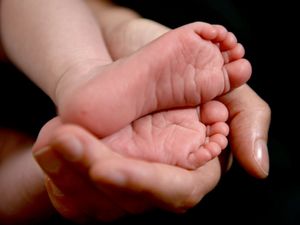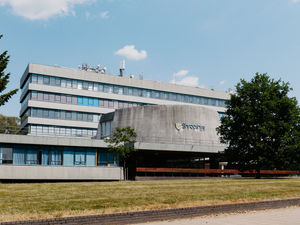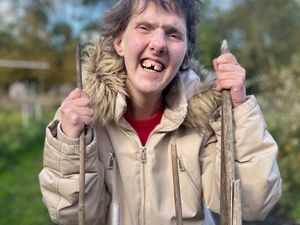How Shropshire charity money is helping people in Uganda
Women's Editor Tracey O'Sullivan reports on her trip to Uganda, where she saw how Shropshire charity cash is helping some of the world's most needy families through unimaginable hardship.
Women's Editor Tracey O'Sullivan reports on her trip to Uganda, where she saw how Shropshire charity cash is helping some of the world's most needy families through unimaginable hardship.
It's 3am. It's dark. I'm alone. There's no electric in my room, my torch has run out and the heavy metal door affords no natural light. All I can hear are strange noises outside.
I am so far from home, and in such alien circumstances, I panic. At that moment I feel on the verge of losing it in a big way.
Then, suddenly I am ashamed. Deeply ashamed at being so distraught at what was simply a night or two outside my comfort zone, in a room which may have been basic but is more or less safe. More importantly, I was not cowering in the corner clutching my children tight - afraid that at any moment they would be stolen away in the middle of night.
I am a mother, and I know that this is what constitutes real fear. Women in Uganda have lived in that kind of terror for 20 years.
When terror hits, you focus on your family. And that is what the mothers of Uganda have done time and time again.
They had no idea of the turmoil they would endure for two decades after violence broke out in 1986 when the Lord's Resistance Army launched its tirade of abuse and cruelty on the people of Northern Uganda.
The grief suffered is overwhelming. There is no other word to describe it. On my first day in the Gulu District I met Grace Achiro. After she was abducted at the age of just 12 she was handed to one of the commanders of the LRA as his wife . . . in other words, a sex slave. Asked about her time in captivity, she struggled to talk about the terrifying situation when many young girls were raped at the hands of their abductors. Grace did give birth to a baby girl in the bush with no medical treatment, and was also responsible for trying to look after many of the children abducted after her.
But it was her daughter who inspired her to seek out freedom. Many of the children became resigned to their fate after LRA members forced them to kill others within their own community, leaving them afraid to return home for fear of reprisals. They were also moved around regularly in the bush so they lost all bearings of where they were.
But Grace could not ignore the pleas of her own daughter.
 "She said this cannot be home to me and asked me where was home," recalled the 30-year-old, whose daughter was about nine at that time. Often ages and years become blurred when the fight is for survival.
"She said this cannot be home to me and asked me where was home," recalled the 30-year-old, whose daughter was about nine at that time. Often ages and years become blurred when the fight is for survival.
Grace summoned the courage one night to break away and run for her life, and the life of her child which was under constant threat. She flagged down a man passing on a motorbike who helped her to get to a special centre for returning abductees.
From here she was taken to meet the Caritas team, partners of Cafod, in Gulu who set about helping Grace to rebuild her life. But it was to come with more tragedy after her daughter passed away aged just 12 from complications related to being HIV positive. She also had to cope with the death of her brother and has since taken on the responsibility of her niece and two nephews. But for Grace, her escape did bring her some sense of peace.
"I did not want my daughter to die like a dog in the bush," said Grace, who has felt the added contentment of having introduced her to her family and found acceptance for them both.
Now a trained tailor thanks to Caritas, Grace has moved into a small settlement in Gulu near her aunt and makes a living through selling her work.
It allows her to pay for the education of her niece and nephew. Yet Grace's face is haunted by the things she has seen and the tragedy she has suffered, and while her smile is not without a certain weariness she does light up from time to time, especially when talking about the role of mother she now plays to her extended family.
Because children the world over have a habit of demanding the future they deserve, and inspiring adults to do all they can to provide it. And the new generation has certainly helped Uganda to heal some of the deep scars left by the conflict.
In the village of Luizira which was decimated as youngsters were abducted and the remaining families moved to the harsh and controlled setting of a refugee camp, it is the innocent and carefree play which sums up the early signs that life could once again be good.
Families displaced during the 20-year war are now returning, and starting to looking ahead.
Young mother Doreen Anek is part of that future, and with a young family is determined to make it work.
At only 25, she carries a burden many of us can only imagine. She grew up at a time when her parents lived in great fear that she would be taken at any time.
And now, although she can raise her own family in much greater calm, she still has many difficult challenges to face.
"I am happy that we can now as a family grow food which means we can feed our children but there is still not always enough," said Doreen, who admitted she sometimes struggled to breastfeed her three-week-old daughter Sunday because of the lack of provisions.
"There is a school here at the village but my greatest fear now as a mother is that my children will need medical care and we live some distance away. We don't have the basic medical supplies here in the village to treat some illnesses and we do worry that our children may not get the care they need in time.
"And my greatest hope as a mother is the peace we have at the moment continues so that we can live without fear. I am hopeful that my children will have greater opportunities and that we can continue to build our lives here."
Doreen has a beautiful smile and as her baby sleeps contently in her lap you feel that sense of pride in her new life. It is a fragile peace in Uganda after hostilities came to an end in 2006, but without all parties signing the official peace deal.
But Doreen and her community are not after a quick fix. They are only too happy to work hard to secure their future. Cafod, which has three groups in Shropshire raising important cash, and Caritas have given them a great start and they are determined to continue building bridges and laying foundations.
The war may be over, but the work has just started to repair the damage done and the scars left behind.





